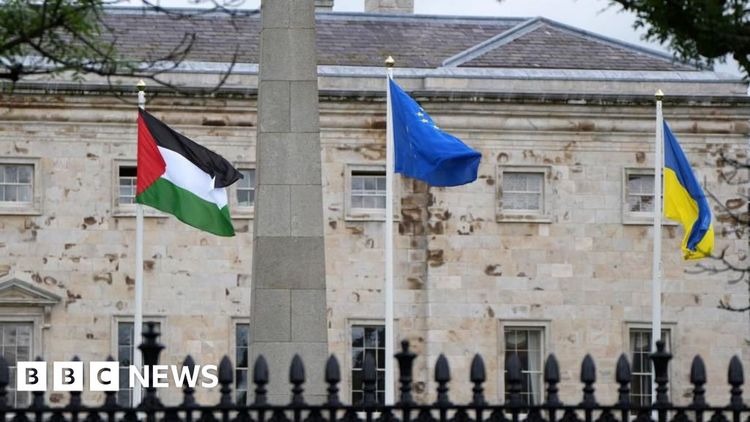Gaza war: Spain, Ireland and Norway formally recognise Palestinian state

Spain, Ireland, and Norway have acknowledged the existence of a Palestinian state, with the aim of redirecting efforts towards resolving the ongoing conflict in the Middle East.
Their aim is to inspire other European nations to unite with them in a diplomatic effort that may lead to a truce in Gaza and the liberation of hostages who are currently held captive by Hamas.
The decision that holds significant symbolic meaning has caused an intense dispute with the government of Israel, who have claimed that all three countries are essentially giving support to terrorism.
Israel has recalled its ambassadors from Ireland, Norway, and Spain and given formal warnings to their representatives in Tel Aviv. The summoned diplomats were shown footage of the October 7th attacks in the presence of journalists.
When three nations acknowledge Palestine, it puts more pressure on Israel in terms of diplomacy. This comes after two global courts demanded an end to the IDF's activities in southern Gaza and charged Prime Minister Benjamin Netanyahu with war crimes.
The occupied Palestinian territories are subject to increased sanctions by Western nations on Israeli settlers as well.
Each country has its own protocol for recognizing Palestine diplomatically. However, it generally involves an official exchange of credentials with the Palestinian Authority located in Ramallah.
The current consulates or missions located in the West Bank or East Jerusalem will be upgraded to official embassies, and their delegates will then hold the title of ambassador.
The three nations confirmed their acknowledgement of a Palestinian state, grounded on the borders ascertained before the 1967 war, with Jerusalem serving as the capital city for both Israel and Palestine.
The flag of Palestine was hoisted above the parliament of Ireland as lawmakers spent four hours discussing the matter. The Taioseach (prime minister) Simon Harris referred to the decision as a noteworthy and significant event prior to it being formalized by the Cabinet.
He expressed his desire for other European nations to emulate this move as they need to utilize all strategies available to them to promote a truce.
According to Mr. Harris, the current moment is significant and shows the world that countries can adopt practical measures to preserve the possibility of a two-state solution, even though other forces are attempting to destroy it using violent methods.
When Norway officially acknowledged Palestine as a state, the Foreign Minister, Espen Barth Eide, expressed his excitement, calling it a day of significance for the relationship between Norway and Palestine.
Before the Spanish cabinet's gathering, Prime Minister Pedro Sánchez expressed that acknowledging Palestine wasn't solely a question of past fairness, but rather a "mandatory condition" for us to reach a state of harmony.
He maintained that Spain was not taking action against Israel, but rather standing up against Hamas, which is against the idea of having two separate states.
Israel seems to be particularly upset with Spain. The Israeli Foreign Minister, Israel Katz, has uploaded a video on social media. The clip illustrates Flamenco music and dancing while at the same time, depicting graphic images of the 7th October attack. The video is accompanied by a message which reads: "Thank you, Spain, for supporting Hamas."
The statement made by Mr. Katz was deemed outrageous and repulsive by Spain. Additionally, Mr. Katz produced equivalent recordings relating to Ireland and Norway.
The disagreement intensified when Yolanda Díaz, the deputy Prime Minister of Spain, openly demanded that Palestine should be liberated "from the river to the sea" - a contentious statement that several Israelis view as anti-Semitic and a plea to wipe out the entire nation of Israel.
Mr. Katz responded to Ms. Diaz's statement on X (formerly Twitter) on Tuesday by making a comparison. He likened her to the Hamas commander, Mohamed Sinwar and Iran's supreme leader, Ali Khamenei. Mr. Katz conveyed to Mr. Sanchez that unless he dismisses his deputy, he would be complicit in aiding the incitement to commit genocide and war against the Jewish people.
Diplomats have a strong suspicion that Israel has reacted strongly towards Spain, Ireland, and Norway as a means of deterring other countries from emulating their actions.
Lately, Slovenia, Malta, and Belgium have shown an interest in acknowledging Palestine. Nevertheless, it appears that Belgium's administration has become less enthusiastic about this notion as the elections approach.
The Prime Minister of Belgium, Alexander De Croo, expressed his desire to delay the recognition of Palestine until other major European countries follow suit. He believes that the recognition would hold greater significance if done in unison. In his opinion, mere symbolism does not serve any purpose.
Around 139 nations have given official recognition to the state of Palestine.
The general assembly of the United Nations voted on May 10th, and 143 members out of 193 agreed to grant Palestine's request for full UN membership. This is an exclusive privilege that only states are eligible for.
At present, Palestine holds a superior observer standing within the UN, granting it a place in the assembly but lacking the ability to vote. Additionally, numerous global institutions such as the Arab League and Organisation of Islamic Co-operation acknowledge Palestine's legitimacy.
Only a few European nations have officially accepted Palestine's existence as a country. These countries are a mix of former Soviet Union allies and recent nations like Sweden and Cyprus. The former Soviet Union countries, including Hungary, Poland, Romania, Czechia, Slovakia, and Bulgaria, have been supporting Palestine since 1988.
Several European nations and the United States have stated that they will only acknowledge the existence of a Palestinian state if it is a component of a durable resolution to the Middle East conflict.























































